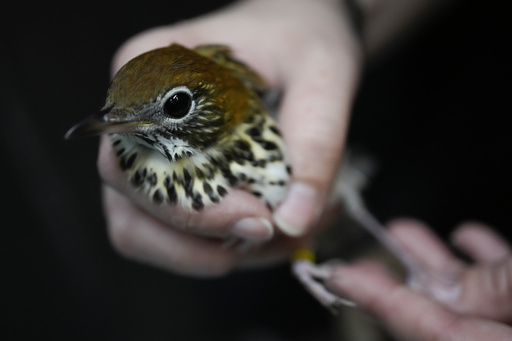CHICAGO — At dawn, armed with a fluorescent green net, Annette Prince strolls through a plaza in downtown Chicago, keeping a watchful eye on her surroundings.
Before long, she spots a small yellow bird resting on the concrete. It remains still as she swiftly catches it, carefully placing it in a paper bag adorned with notes on the date, time, and location.
“This is a Nashville warbler,” explains Prince, who leads the Chicago Bird Collision Monitors. “The bird likely collided with the glass window of a nearby building. He weighs roughly the same as two pennies, and he’s squinting due to a headache.”
For organizations like the Chicago Bird Collision Monitors, such incidents are common occurrences during the spring and fall migration seasons when birds often crash into homes, smaller structures, and even the city’s towering skyscrapers.
Last fall served as a poignant reminder of the dangers these birds face, with 1,000 of them tragically perishing in one night after colliding with the glass facade of McCormick Place, a prominent convention center by the lakeshore. In response, the center introduced bird-safe window film this fall, investing $1.2 million into a project that covered enough glass to span two football fields with tiny dots designed to break reflections.
Doug Stotz, a senior conservation ecologist from the Field Museum, expresses hope regarding the initiative’s effectiveness. He mentions that preliminary observations suggest only about 20 birds have succumbed to collisions with the center’s glass this migration season, a promising indication.
“We lack extensive data since this just started, but so far, it appears to be making a significant impact,” Stotz commented.
In the meantime, a network of volunteers is ready to assist the birds impacted by collisions across Chicago. They are committed not just to rescuing affected birds but also to enlightening officials and advocating for better building designs, lighting strategies, and other modifications to mitigate the widespread issue of bird deaths caused by such collisions.
Prince explains that she, along with other volunteers, patrols downtown areas to collect data on birds that are injured or killed.
“There’s a concentration of millions of birds migrating through here, coupled with extensive artificial lighting we create at night, which confuses and attracts them to glass,” Prince articulated.
Detailed records are often kept of deceased birds for scientific research purposes, including contributions to the Field Museum of Natural History. Meanwhile, rehabilitated birds are delivered to local centers, such as the DuPage Wildlife Conservation Center in the suburbs.
Recently, veterinarian Darcy Stephenson at DuPage administered anesthesia to a yellow-bellied sapsucker before securing its wings for an X-ray. The bird had arrived with a report categorizing its injuries as a collision with a window.
Upon inspection, it was confirmed that the bird had sustained a broken ulna, a bone in its wing.
On average, the center receives about 10,000 animals each year, with a significant 65% being birds, many of which are victims of window collisions. During peak migration times in the fall, the center can receive hundreds of birds in a single day.
“The majority of these birds actually recover and return to the wild after we provide treatment,” revealed Sarah Reich, the head veterinarian at DuPage. “Shoulder fractures tend to heal very quickly, and soft tissue injuries generally recover well. The more complicated cases arise when the trauma is not readily visible.”
Injured birds undergo a thorough flight assessment, receive complete physical examinations from the veterinary team, and are rehabilitated before their release back into nature.
“We’re thrilled to release them, especially in cases where we are cautiously optimistic or encounter injuries we’ve never treated successfully before,” Reich remarked, adding that these challenging cases excite the clinic staff greatly.
